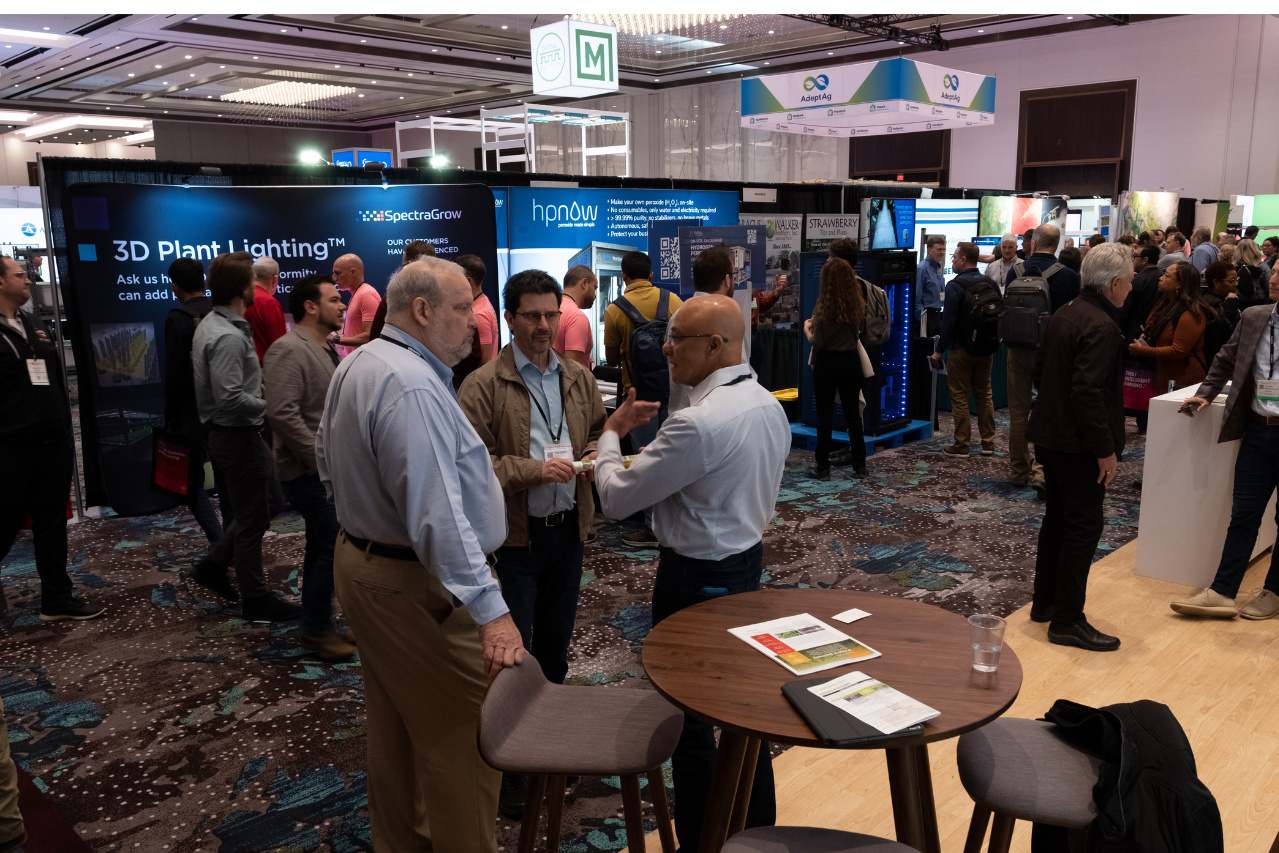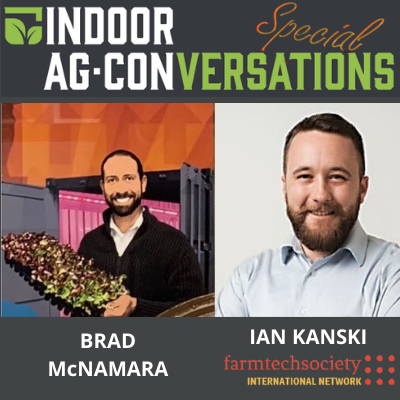Indoor Ag-Con Returns March 11-12, 2024 To Caesars Forum Las Vegas
200+ Exhibitors, Three Keynotes, Engaging Conference, and Networking Events
Indoor Ag-Con, the largest and leading trade show and conference dedicated to vertical farming | greenhouse | controlled environment agriculture, will return to Caesars Forum March 11-12, 2024 for its 11th annual event. Indoor Ag-Con unites farmers, growers, ag tech leaders, suppliers, advocates and enthusiasts under one roof to experience all that Indoor Ag-Con has to offer: 200+ Exhibitors, Three Keynotes, Networking Events, Conference Sessions and more.
Indoor Ag-Con attendees will also have access to the National Grocers Association (NGA) Show, the leading tradeshow and conference for independent grocers, which will once again co-locate with Indoor Ag-Con.
“After a successful 2023 event, we are excited to once again converge in Las Vegas to bring together our exhibitors, speakers, partners, and attendees from around the globe,” said Brian Sullivan, CEO, Indoor Ag-Con. “Indoor Ag-Con is the place to experience the most cutting-edge indoor agriculture products from the most innovative companies in the world, engage in important conversations at our Conference sessions, hear from the top leaders in our industry including three inspiring Keynotes and connect with peers in the industry.”
Robust Conference
The Conference features two jam-packed days of educational and insightful sessions from 80+ speakers in four tracks including Planning & Operations, Grower, Cultivating Possibilities and NEW this year, the Cannabis track. Designed specifically for cannabis cultivators, these track sessions will dive into the key industry issues and share best practices for ideal grow environments. Indoor Ag-Con’s Conference sessions will span multiple topics including “Bridging the Gap Between CEA Producers and Buyers”, “Past, Present and Future: The State of the Evolving Cannabis Landscape”, “Roadmap to Data Standardization In CEA,” “Mushrooming Success: Navigating Trends and Opportunities in the Culinary Mushroom Market,” among others that are making an impact on the indoor agriculture industry.
New for 2024, the Indoor Ag-Con CEA Food Safety Pre-Event Workshop: Internal Review Certification, will be held on Sunday, March 10, 1-5pm and is designed for anyone in the controlled environment agriculture industry dedicated to ensuring the highest standards of food safety and quality. Internal auditing certification is a mandatory GFSI (Global Food Safety Initiative) requirement that demonstrates an individual’s ability to conduct internal assessments of any food safety program. Indoor Ag-Con has partnered with Ceres University, a leading provider of IACET-accredited food safety training and certification, to offer a cost-effective, convenient way to build your career AND help fulfill GFSI scheme requirements.
Three Keynote presentations
In addition to Indoor Ag-Con’s Conference sessions, the event will feature three inspiring Keynote speakers, including this year’s headliner, Paul Sellew, Founder and CEO of Little Leaf Farms, who will give the 2024 edition’s opening morning headline keynote address on Monday, March 11th at 8 am. Sellew has built a successful career on his belief in sustainable agriculture. With over 30 years of experience developing and leading successful companies, Sellew is on a mission to transform the way food is grown through peri-urban agricultural practices that are rebuilt for the modern world.
Additional Keynote speakers will be announced soon.
Expanded Expo Hall
The expanded Expo Hall, will be home to 200+ world-class exhibitors featuring the most cutting-edge technologies, products and services in the indoor agriculture industry from lighting and control systems to substrates, equipment, irrigation systems and much more. Don’t miss sessions on the Expo Floor in the Expo Hall Theater where industry leaders offer 45-minute presentations on hot topics.
Networking Events
Mix and mingle with new and old friends at daily events including the Vivid Canopy Panel & Networking Event hosted by GLASE – the Greenhouse Lighting and Systems Engineering Consortium – and Eden Green Technology, Conference Lunches, Expo Hall Happy Hour, and many more fun and engaging events.
For more information on the full line-up of sessions, exhibitors and events, please visit www.indoor.ag.
ABOUT:
Founded in 2013, Indoor Ag-Con has emerged as the largest trade show and conference for vertical farming | greenhouse |controlled environment agriculture. Its events are crop-agnostic and touch all sectors of the business, covering produce, legal cannabis | hemp, alternate protein and non-food crops. More information, visit www.indoor.ag.


 Sensei Ag CEO Sonia Lo will lead the Indoor Ag-Con keynote presentation, “Improving Human Wellness One Farm At A Time,” on Monday, October 4, 2021 from 11:30 am – 12:20 pm. A headliner event at the October 4-5, 2021 edition at the Hilton Orlando, Lo’s discussion will focus on Sensei Ag’s form factor agnostic approach to building and expanding indoor farms.
Sensei Ag CEO Sonia Lo will lead the Indoor Ag-Con keynote presentation, “Improving Human Wellness One Farm At A Time,” on Monday, October 4, 2021 from 11:30 am – 12:20 pm. A headliner event at the October 4-5, 2021 edition at the Hilton Orlando, Lo’s discussion will focus on Sensei Ag’s form factor agnostic approach to building and expanding indoor farms.
 Being form factor agnostic is core to Sensei Ag’s business model and growth plan. We are indoor growers – not just greenhouse growers, not just vertical farm growers. With that said, it’s not just about the types of leafy greens and other produce we will be able to grow using different form factors, but also the ability to venture into new regions of the globe, areas that were traditionally considered food deserts but through one form factor or another can now become food oases.
Being form factor agnostic is core to Sensei Ag’s business model and growth plan. We are indoor growers – not just greenhouse growers, not just vertical farm growers. With that said, it’s not just about the types of leafy greens and other produce we will be able to grow using different form factors, but also the ability to venture into new regions of the globe, areas that were traditionally considered food deserts but through one form factor or another can now become food oases. myself down the line. That said, after spending the majority of my career in finance and tech, I can truly say that I am the happiest growing local, nutritious food for others. I joined Sensei Ag last April for the once-in-a-lifetime opportunity to spearhead a company developing science focused on human wellness from food and agriculture systems. As CEO, I am very honored to lead an exceptionally talented team of professionals who together share one vision and that is to increase adoption of indoor agricultural production globally.
myself down the line. That said, after spending the majority of my career in finance and tech, I can truly say that I am the happiest growing local, nutritious food for others. I joined Sensei Ag last April for the once-in-a-lifetime opportunity to spearhead a company developing science focused on human wellness from food and agriculture systems. As CEO, I am very honored to lead an exceptionally talented team of professionals who together share one vision and that is to increase adoption of indoor agricultural production globally. Nevertheless, the journey thus far has been incredible. I’ve never been known to take the straight and narrow path. Ask anyone about the twisted, curvy roads on Lana’i. Yet, in my mind, there’s never been a more crucial time in our world’s history to address global food insecurity, to encourage and develop new means of promoting health and wellness and to heal and nourish our planet. I look forward to the adventure that lies ahead.
Nevertheless, the journey thus far has been incredible. I’ve never been known to take the straight and narrow path. Ask anyone about the twisted, curvy roads on Lana’i. Yet, in my mind, there’s never been a more crucial time in our world’s history to address global food insecurity, to encourage and develop new means of promoting health and wellness and to heal and nourish our planet. I look forward to the adventure that lies ahead.
 “We are thrilled to have the opportunity to work with Brad McNamara and FarmTech Society Chair Ian Kanski for this special edition of our Indoor Ag-Conversations series. “Calling upon their own proven, hands-on industry experience and knowledge, Brad and Ian have put together an incredible program. It will give attendees a crystal clear roadmap to build their CEA funding strategy – from seed to scale.”
“We are thrilled to have the opportunity to work with Brad McNamara and FarmTech Society Chair Ian Kanski for this special edition of our Indoor Ag-Conversations series. “Calling upon their own proven, hands-on industry experience and knowledge, Brad and Ian have put together an incredible program. It will give attendees a crystal clear roadmap to build their CEA funding strategy – from seed to scale.”

 By taking in large quantities of data from a variety of environmental, system and plant sensors, AI techniques can be applied to optimize performance of the vertical farming system and assist growers in their role as farm operator. While traditional sensor readings like temperature, humidity and flow rate are vital, plant imagery is a requirement to unlock AI’s power in vertical farming. Without high-frequency, high-resolution, hyper-spectral imagery of all plants in vertical farm production, the vertical farming industry will never reach its full potential. OnePointOne has focused heavily on collecting, analyzing and providing that imagery data to our growers.
By taking in large quantities of data from a variety of environmental, system and plant sensors, AI techniques can be applied to optimize performance of the vertical farming system and assist growers in their role as farm operator. While traditional sensor readings like temperature, humidity and flow rate are vital, plant imagery is a requirement to unlock AI’s power in vertical farming. Without high-frequency, high-resolution, hyper-spectral imagery of all plants in vertical farm production, the vertical farming industry will never reach its full potential. OnePointOne has focused heavily on collecting, analyzing and providing that imagery data to our growers. The highest-impact application of AI in vertical farming is through the analysis of environmental, system and plant-imagery data-points and their corresponding impact on plant yield and quality.
The highest-impact application of AI in vertical farming is through the analysis of environmental, system and plant-imagery data-points and their corresponding impact on plant yield and quality. For ten thousand years farming was local and provided a diverse range of nutrients for the community. Today, we have no idea where our food is coming from and we are losing the nourishment battle. Willo exists to reconnect us to the farm and ensure that we are nourished by the highest quality foods imaginable.
For ten thousand years farming was local and provided a diverse range of nutrients for the community. Today, we have no idea where our food is coming from and we are losing the nourishment battle. Willo exists to reconnect us to the farm and ensure that we are nourished by the highest quality foods imaginable.